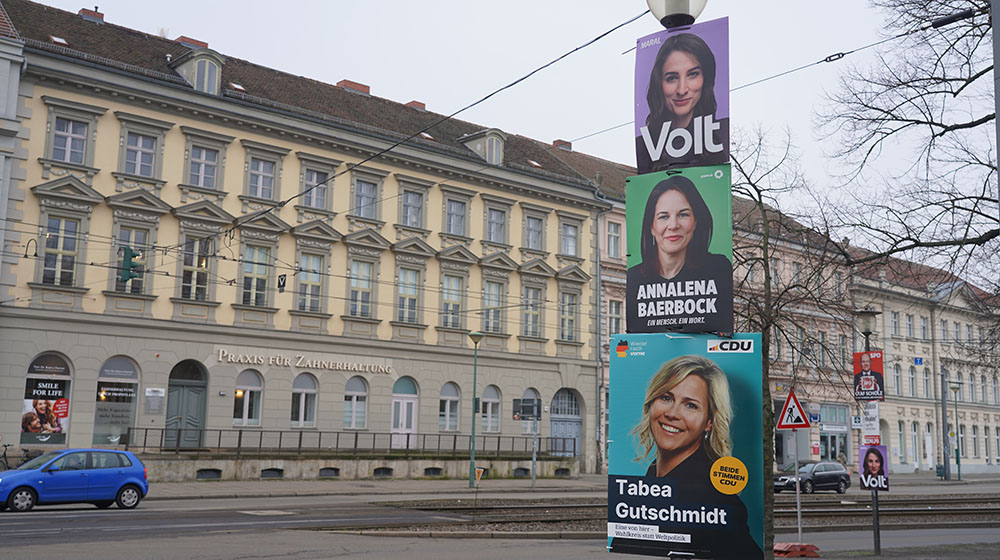
The election to the 21st German Bundestag will take place as an early election on February 23, 2025. The parties are currently fighting for the votes of the citizens - election posters, which can now be seen on every street, are still an important tool for this. Editor Isabell Meißner spoke to linguist Kersten Sven Roth about election propaganda, what rhetoric is being used and whether the use of language is becoming more and more extreme.
What is election propaganda and how can I recognize it?
Actually, it's not good to talk about propaganda. It has a very negative connotation in everyday language and sounds like immoral manipulation. In reality, however, it is a competition in which the voters also know that they are - quite openly - being wooed. If you want to play it up, you could say that this competition for the greatest persuasive power is the original principle of democracy, as it originated in the popular assembly of ancient Athens.
In a democracy, the sovereign is still all of us as the people being wooed. It is our task and responsibility not to be lured by the cheaper argument and the bigger promise, but to critically examine what is being used to convince us.
What are typical rhetoric and language customs before the federal elections?
In general, it can be said that in democracies, certain basic strategies that always characterize political communication only become particularly pronounced during election campaigns: The systematic devaluation of the political opponent and one's own enhancement, for example, or the very strict orientation towards a strategically defined target group. This can be your own core electorate, for example, or voter groups that you want to tap into for the first time.
But of course the phase immediately before an election is also one that has a few special features. Above all, the actors do not know what the balance of power will look like immediately after the election. That's why it's actually particularly typical for election campaign communication to avoid making concrete statements and instead use big buzzwords such as “freedom”, “security” or “cohesion” in an attempt to be convincing and sufficiently vague at the same time. This makes what we experienced in the Bundestag last week all the more astonishing. The CDU's attempt to force the SPD and the Greens to agree to a motion for a resolution in order to raise their own profile, which made them dependent on the AfD, was, to put it mildly, surprising to say the least.

Prof. Dr. Kersten Sven Roth, Linguist at the University of Magdeburg (Photo: Jana Dünnhaupt / University of Magdeburg)
What role do election posters play here?
For decades, election posters were probably the most important instrument of the election campaign, alongside the personal appearances of candidates at events with citizens. They have the advantage that they make it possible to reach out to voters without them having to specifically seek out their own campaign. The typical cityscape at election times, with entire squares and streets dominated by the colors, slogans and photos of the parties, also naturally creates a very strong public presence for the election event in general. This is important for functioning democracies because it encourages people to vote.
Nevertheless, it has to be said that such a classic medium as the poster has definitely become drastically less important in recent years. Some parties realized a long time ago, others are just following suit, that social media offers much more effective opportunities to reach potential voters. They have one advantage above all others: they can be used to target specific groups and reach the right people with the right messages. However, this is more difficult for parties that want to score points through content than for populist parties. Their simplistic and often provocative statements are systematically favored by the algorithms of social media apps and spread further. In the medium term, this will change democratic election campaign communication in general.
Is the use of language in these elections becoming more and more intense? Or is that just a feeling?
Yes, it does. The reasons are manifold. First of all, they have to do with a crisis in the traditional public sphere. As long as the political debate is essentially organized by journalistic media that follow certain quality standards, the one or other drastic exaggeration is not possible or is counterproductive for those who make it.
This is different in the digital public sphere, where basically only the loud is audible. But of course it also has to do with the global triumph of political movements that base their communication strategies very directly on openly expressing their contempt for democratic institutions and decision-making processes. This is indeed a phenomenon that can be observed across Europe and even worldwide, and Donald Trump's re-election has just created a particularly effective pattern for this.
However, this is no longer about intensifying the debate between people and offers. The supposedly so refreshing rhetorical battles below the belt of politicians such as Wehner or Strauß are so often referred to with mainly West German nostalgia. But this generation, shaped by the experiences of the Nazi dictatorship, was never concerned with the question of whether the democratic constitution as such was worth preserving or not.
Are there any differences in the use of language compared to previous elections?
Yes, they probably exist. At the beginning of February, less than two weeks before the election, the “Arbeitsstelle für linguistische Gesellschaftsforschung” at the University of Magdeburg organized a conference on the rhetoric and language of the Bundestag election campaign together with the specialist association “Sprache in der Politik” and the Junge Akademie Berlin. Our starting point is precisely this thesis: This is an election campaign of a completely new kind. It is the first parliamentary election campaign in which all parties should have recognized the importance of digital media. It is an election campaign that is taking place after a particularly dramatic break-up of a coalition in which three democratic parties have suffered great damage to their reputation and the trust of the people. And finally, it is an election campaign in which all forecasts see a party as the second-strongest force that all other parties across the ideological spectrum have actually said they will not form a government with. The often overused term “directional election campaign” does not seem to be an exaggeration in this case.
This was actually only comparable in the 1990s in East Germany with the PDS, which never had this nationwide significance. Basically, this would force us to forego a tough confrontation between those parties that consider each other to be democratic. But that would be a completely new kind of solidarity campaign, which is not on the cards. The party strategists obviously lack the patterns for this, although they could perhaps learn something from Saxony-Anhalt, where a government of this kind has been operating stably for a very long time.
